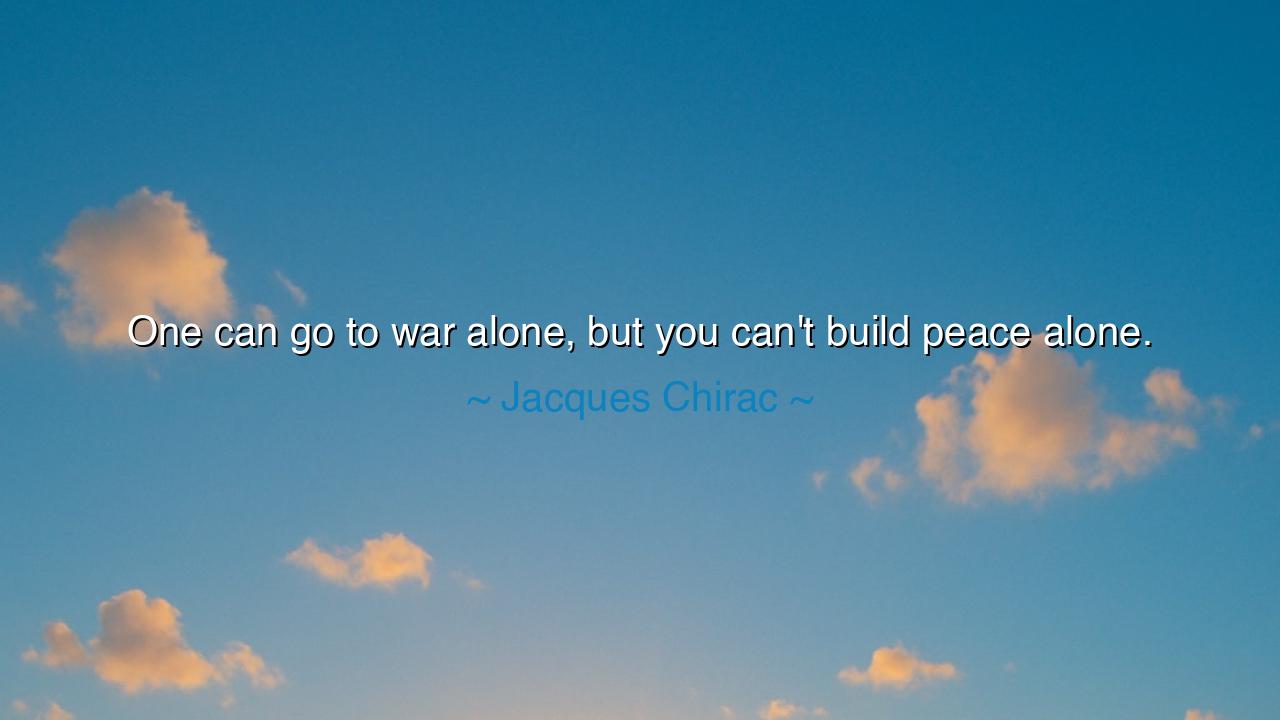
One can go to war alone, but you can't build peace alone.






"One can go to war alone, but you can't build peace alone." These words by Jacques Chirac speak to a powerful truth about the nature of conflict and reconciliation. In the heat of battle, an individual can take up arms, driven by personal conviction, by the call of duty, or by the command of a higher authority. The path to war is often one of self-interest, pride, or defense of ideals, and it can be waged by a single person or a small group. Yet, peace—true, lasting peace—requires something more profound: the collective effort, the unity, and the cooperation of many. War may be waged by one, but peace is a creation of all.
In the ancient world, the great philosophers and leaders often spoke of the inherent strength in unity, and the critical need for cooperation to build societies of peace and justice. Plato, in his dialogue The Republic, envisioned a city founded not by the individual’s might or power but by the collective effort of philosophers, soldiers, and workers all working in harmony. This collective effort was the foundation of a just and peaceful society. In the same vein, Chirac’s words remind us that peace cannot be achieved by the will of one alone; it is through the collaboration of individuals, nations, and cultures that we build a world where harmony and justice can thrive.
The contrast between war and peace is striking. War, as Homer shows in his Iliad, is driven by the passions of men—by anger, revenge, and pride—and often seeks only the destruction of enemies. Achilles, in his rage, fights not for the betterment of all but for personal glory and vengeance. Even though he is a mighty warrior, Achilles’ path is ultimately one of loneliness and despair, for war, despite its might, never leads to true peace. Peace, on the other hand, demands a different kind of strength—one that requires sacrifice, forgiveness, and the willingness to put the common good above the individual.
Consider the Treaty of Versailles, signed at the end of World War I. Though a peace agreement between warring nations, it was a peace that was fractured from the outset. The treaty was largely shaped by the victorious powers, who sought punishment and reparations from the defeated. In the aftermath, Germany was left humiliated and burdened by debt, and the peace that was intended to bring closure to the war sowed the seeds for future conflict. True peace-building is not about victory and punishment; it is about reconciliation, and that requires all parties to engage in dialogue, to understand one another’s perspectives, and to make concessions. The failure of the Versailles Treaty illustrates the truth that peace requires cooperation and effort from all sides—not a solitary imposition by the victorious.
Nelson Mandela provides a modern example of peace-building in the face of deep division. After decades of apartheid and racial injustice in South Africa, Mandela emerged not as a man seeking revenge, but as a leader who understood that lasting peace could only be built through reconciliation. He reached out to the very people who had oppressed him and his people, not to punish them, but to forge a path toward a unified nation. His willingness to engage with former adversaries, his call for forgiveness rather than retaliation, and his deep commitment to inclusive dialogue created the foundation for the peace that South Africa enjoys today. Mandela’s life and leadership stand as a powerful testament to the truth that peace is not a solitary pursuit—it is an effort that requires the participation of many.
Chirac’s words, therefore, carry with them a lesson of profound importance: while it may take the will of one to engage in war, it takes the collective will of many to create peace. Peace-building is not simply about the cessation of violence; it is about the creation of conditions in which understanding, cooperation, and justice can thrive. It requires all of us to work together, to set aside our differences, and to commit to the well-being of the whole. Solitude and individualism may fuel conflict, but it is in the collective spirit of unity, mutual respect, and shared sacrifice that true peace is found.
In practical terms, the message from Chirac is a call to action for us all. In our personal lives, our communities, and our nations, we must work together to build peace. This means engaging in dialogue when we would rather fight, making concessions when we feel entitled, and choosing forgiveness over retribution. Whether it is in the realm of international diplomacy or our day-to-day relationships, the principles of cooperation and shared effort are the building blocks of lasting peace. Just as Mandela and other great peace-builders have shown, peace is not something that can be imposed; it is something that must be nurtured, cultivated, and sustained through the efforts of all.
Chirac’s words remind us that we all play a part in the creation of peace. Whether in moments of global conflict or personal disagreement, let us recognize that peace requires the effort of many—working not as isolated individuals, but as a unified whole, committed to the good of all. It is only in this collective effort that we can truly heal the wounds of war and division, and create a world where peace reigns.






AAdministratorAdministrator
Welcome, honored guests. Please leave a comment, we will respond soon